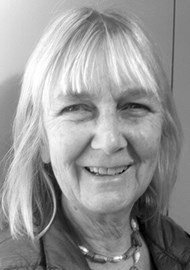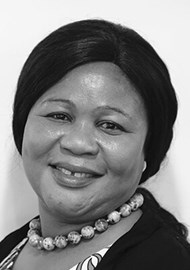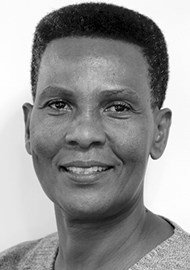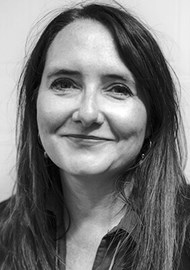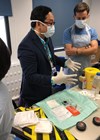Ophthalmic nurses (ON) have been the backbone of eye health services in Africa since the mid-20th century and remain the largest single cadre of allied ophthalmic personnel in Commonwealth countries in Africa.
Numbers are currently estimated at between 3500 and 4000. Eighty-six percent of ONs work in the government sector; 82% work in rural areas. In contrast, two-thirds of ophthalmologists work in capital cities. ONs are typically registered nurses who undertake an additional qualification in ophthalmic nursing. There are currently 20 ON training schools in 12 Anglophone countries in Africa, with an estimated capacity of 400 new ONs graduating per annum [1].
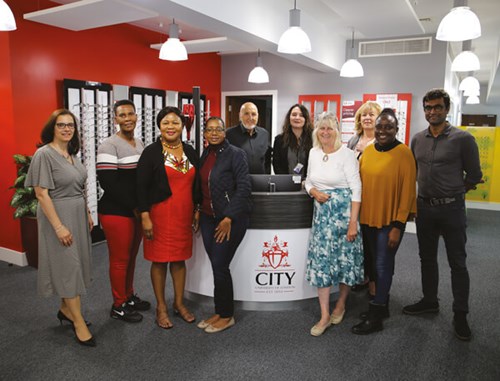
(L-R) Lia Litosseliti, Vumila Mmari, Stella Antwi-Boasiako, Chatawana Molao, Ian Collins, Michelle Hennelly, Denise Mabey, Claire Studley-Scott, Keeleditse Manka Ndlovu and Sanjeev Heemraz at City, University of London’s City Sight Clinic, Northampton Square, London.
The International Agency for the Prevention of Blindness (IAPB) was successful in advocating for the World Health Organization (WHO) Global Human Resources for Health strategy to include a specific reference to eye health workers and has identified developing ON training as a key challenge in strengthening the eye health workforce in Africa.
Some countries are currently extending training in ophthalmic nursing to a degree-level course and three of them – Botswana, Ghana and Tanzania – recently engaged in a curricular capacity-building workshop undertaken with their VISION 2020 LINK partners at City, University of London and at their UK partner hospitals.
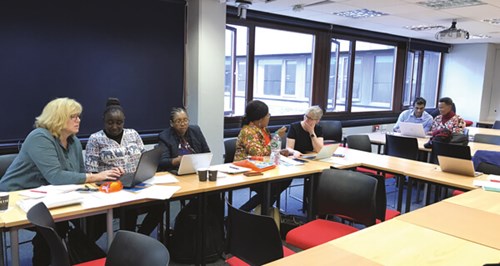
Working together on action plans.
VISION 2020 LINKS are formalised, long-term health partnerships between an eye department in an NHS Trust Hospital in the UK and an eye department in a hospital in Africa, based on the priority needs identified by the African partner. Through LINKS, repeated visits by the same (or similar) team of familiar people bring about lasting change. This ensures longevity of strategic partnerships based on essentials such as trust, joint learning and decision-making, accountability and sustainability of outcomes. Successful LINKS are already in place between the three ON partnerships:
- Korle Bu Teaching Hospital, Ghana and Moorfields Eye Hospital, London
- Princess Marina Hospital, Gaborone, Botswana and Cambridge Global Health Partnerships (formerly Addenbrooke’s Abroad)
- Muhimbili National Hospital, Tanzania and St Thomas’ Hospital, London.
The goals of the ophthalmic nursing curriculum development workshop were to:
- Develop and / or strengthen a harmonised degree-level curriculum for ONs in Botswana, Ghana and Tanzania
- Build sustainable LINKS support for ophthalmic nursing between the three partners
- Enhance the training of faculty from the three schools of ophthalmic nursing to deliver the new curriculum.
The workshop was timely as two key 2019 publications on core competencies are now available to map to the ophthalmic nursing curriculum:
- Core competencies for the eye health workforce in the WHO African Region [2]
- Royal College of Ophthalmologists’ Ophthalmic Common Clinical Competency Framework (OCCCF) covering four clinical areas [3].
These documents were used with reference to two previous documents for nurse educators:
- Nurse educator core competencies – WHO 2016 [4]
- The nature, scope and value of ophthalmic nursing – Royal College of Nursing 2016 [5].
Ghana case study
Korle Bu Ophthalmic Nursing School in Accra, Ghana, affiliated to the University of Cape Coast, is the only college in Ghana that offers a BSc in Ophthalmic Nursing. The course was developed in collaboration with the Ministry of Health, Nursing and Midwifery Council, university and other stakeholders.
The first batch of 48 students started in 2016 and graduated in 2018. Some advanced diploma students were also offered a top-up qualification. At present there are 80 and 91 students in the second and first years. Stella Antwi-Boasiako, Principal of the Ophthalmic Nursing School, is justly proud of the quality of the all-round experience but has identified the challenges that she faces. One major problem for her is the lack of a well-equipped skills laboratory at Korle Bu, needed to satisfy nursing accreditation requirements.
Helen Gibbons, Head of Nurse Education at Moorfields Eye Hospital, has been involved with the development of the new eye hospital at Korle Bu. Helen says: “My proudest professional moment was previously doing my first YAG laser, now it is seeing the strides made in education by the ophthalmic nurses at Korle Bu”.
Stella and Helen worked together on their action plan during the workshop. Their plans are:
-
To develop a purpose-built ophthalmic skills lab to improve the training and experience of ONs
-
Leadership skills for all ophthalmic educators to ensure they have the confidence to challenge and change practice
-
Embed competencies into the current curriculum plans
-
Develop faculty exchange programmes whereby nurse educators can learn from each other.
Botswana case study
Ophthalmic nurse training was introduced in Botswana in 2006 as an Advanced Diploma at the Institute of Health Sciences, Molepolole. The diploma was open to qualified nurses and from 2006-2013 the programme produced 46 advanced ONs who are currently deployed in various primary, secondary and tertiary care settings. The Botswana ophthalmic nursing programme is currently producing a new curriculum for a degree level qualification, which hopefully will be signed off by December 2019. The course for 12 nurses will run over an 18-month period. The faculty has been increased from two to four nurses, of whom one is at present undertaking an MSc in Nairobi.
Chatawana Molao is the Head of the Ophthalmic Nursing programme in Botswana and Keeleditse Manka Ndlovu is a Senior Lecturer, also at the Institute of Health Sciences in Molepolole. They attended the workshop at City, University of London with the following objectives:
-
To evaluate and compare ophthalmic nursing training in Botswana against other similar programmes offered internationally to enhance internationalisation of qualifications
-
To learn best practices in other ophthalmic nursing institutions regionally and internationally
-
To benchmark best practices in outcome-based teaching, assessment and clinical teaching practices that could enhance ophthalmic training in Botswana
-
To forge collaborative partnerships and networks with other institutions offering ophthalmic training regionally and internationally
-
To discuss possible pathways for career development and advancement of ophthalmic nursing graduates
-
To apply lessons learnt from benchmarking as appropriate to improve quality of nursing training in Botswana.
Tanzania case study
Ophthalmic nursing is not at present offered as a course in Tanzania. Vumilia Mmari is the National Training Coordinator at the Ministry of Health, Community Development, Gender, Elderly and Children and is charged with introducing the course at five universities in Tanzania. The challenge is to take the curriculum of 2010 and update it to reflect current practice as well as rolling it out to the five universities. She is creating a team with curricular, ophthalmic and educator skills to help her. She has the necessary expertise as she has previously rolled out a degree level course in anaesthetics.
Sanjeev Heemraz is a Nurse Consultant at St Thomas’ Hospital, London which is linked with Tanzania. A number of agencies and nursing groups, led by the IAPB, are working together to examine the development of a global network of ONs in time for 2020, which the WHO has declared the ‘Year of the Nurse and Midwife’ in honour of the 200th anniversary of Florence Nightingale’s birth [6]. Sanjeev is involved with the development of the global network. He will present to the IAPB members’ meeting in Dar es Salaam, in October 2019 and hopes to use the visit to help drive forward the ON curriculum in Tanzania. As a result of working together at City, University of London, Vumilia and Sanjeev formed a warm working relationship and are enthusiastic to continue the collaboration by bringing together senior nurse educators in a curriculum development workshop in Tanzania.
Timetable of workshop
Following the initial day of meetings to establish the training needs and learning outcomes, the key learning points were addressed, with action plans agreed on the third day. The workshops were extensive, covering topics such as curriculum design, teaching enhancements, eye disease, optometry teaching, prescribing and current issues in ophthalmic nursing. There was a visit to the City, University of London skills laboratory, supervised by Alison Coutts (Senior Lecturer, Nursing Division, City, University of London) which impressed everyone.
Discussions took place about the Core Competencies for the Eye Health Workforce in the WHO African Region and the OCCCF documents. Comparisons of curricula across the three countries took place, focusing on similarities, strengths and areas for improvement. All presentations and relevant document links were compiled and given to each country representative on a USB device for use in their programmes.
Action plans
The LINK partners worked together on action plans for the next two to three years, facilitated by City University and London School of Hygiene & Tropical Medicine (LSHTM) staff. On the final day the plans were presented and critiqued by the group. Common themes to emerge were building capacity into the degree course through LINKS faculty exchange visits, whereby nurse educators and faculty members can learn from each other in the planning and delivery of the courses. There was an imperative to embed competencies into the current curricular plans, working with City, University of London, the Royal College of Ophthalmologists and their LINKS partners, through exchange visits and targeted workshops. There was also a desire to establish / reactivate ophthalmic nursing groups to support lifelong learning.
Naturally, as the courses are at different stages of development, there were site-specific action points. Ghana is seeking a purpose-built ophthalmic skills laboratory to improve the training and experience of ONs, as well as enabling approval of the course by the licencing authority. Botswana is looking to exploit technology to establish a virtual learning environment with improved IT connectivity, SMART classrooms and video conferencing facilities. The priority in Tanzania is to bring together the key university and ministry stakeholders to undertake a curricular upgrade and set a date for the start of the degree course.
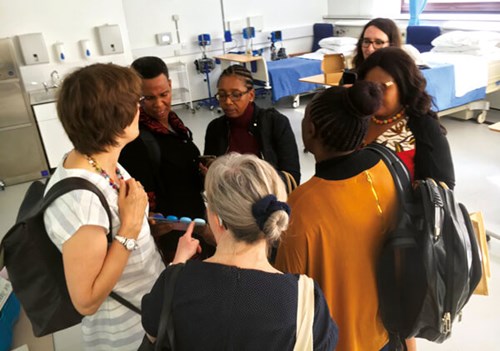
The team in the skills centre at City, University of London (pictured with Alison Coutts, far left).
In planning for the future, presentations and discussions included the concept of having more than one exit award to enable nurses to leave with different skill sets at certificate, diploma and degree level. Part-time studying coupled with smaller academic achievements will increase participation and encourage differentiation of expertise. In time this will develop a more specialised workforce equipped to reflect the vital work of the ON in these countries. Ghana, in particular, is interested in scope of practice and one of their objectives in the action plan is to run a leadership skills course for all ophthalmic educators to ensure they have the confidence to challenge and change practice.
Continuing professional development (CPD) is required to bolster personal development and keep professionals up-to-date with current methods and issues. The action plans of Botswana and Ghana reflected this by including faculty exchange programmes within the LINKS, as well as activating national ophthalmic nursing groups. Methods for making update material available will be explored.
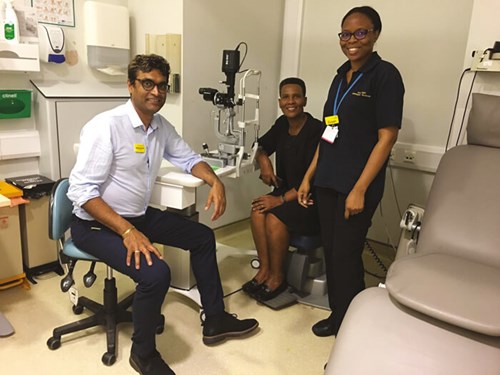
Sanjeev Heemraz and Vumilia Mmari with a colleague at St Thomas’s Hospital.
Action plans are to be revised on a yearly basis, enabling the development plans to evolve and be responsive to educational needs.
After the intensive three days in the classroom, the LINKS teams spent the remainder of the visit at their UK LINK hospitals, seeing advanced ophthalmic nursing in practice.
Feedback
Participants rated their learning from the workshop as either extremely relevant or relevant to their day-to-day activities. On the question of importance to their institutions, it was rated extremely important or important. All other fields concerning confidence in applying the learning were rated very highly.
Participants were then asked to give comments about the learning, which could be shared anonymously. The comments were as follows:
“This was a great learning opportunity for me since I am fully involved in the development of the ophthalmic nursing curriculum with a shift from content based to competency based.”
“The working has created a platform to benchmark best practice from other ophthalmic personnel in the region and internationally, learning resources were shared to support curriculum design and implementation.”
“It’s an eye opener to me on curriculum development and has helped me know what to add and what to take away.”
“The presentations were very educational, in such I have gained knowledge that will assist me as a lead in the ON curriculum review. Thank you for inviting me to this meeting.”

Future plans
The action plans will form the basis of future collaborations and bids to funding bodies for support. However, much can be achieved by the individual LINKS through local funding for exchange visits to keep up the momentum of the collaborations, which received such a boost from this inspiring and motivating week.
Many thanks to the primary sponsor of the visit - Seeing is Believing, Standard Chartered Bank’s global community investment programme to tackle avoidable blindness – together with IAPB.
References
1. Day S. IAPB Africa Editorial: Ophthalmic Nurses and Nursing Now. The International Agency for the Prevention of Blindness 2018:
https://www.iapb.org/news/
iapb-africa-editorial-ophthalmic
-nurses-and-nursing-now/
2. Core competencies for the Eye Health Workforce in the WHO African region. The International Agency for the Prevention of Blindness 2019:
https://www.iapb.org/resources/
core-competencies-for-the-eye
-health-workforce-in-the-who-african-region/
3. The Ophthalmic Common Clinical Competency Framework. Health Education England:
https://www.hee.nhs.uk/our-work/
advanced-clinical-practice/
ophthalmology-common-clinical
-competency-framework-curriculum
4. Nurse Educator Core Competencies. World Health Organization:
https://www.who.int/hrh/
nursing_midwifery/
nurse_educator050416.pdf
5. The nature, scope and value of ophthalmic nursing. Royal College of Nursing:
https://www.rcn.org.uk>pub-005816
6. Executive Board designates 2020 as the “Year of the Nurse and Midwife”. World Health Organization:
https://www.who.int/hrh/news/
2019/2020year-of-nurses/en/
(All links last accessed September 2019)
COMMENTS ARE WELCOME


